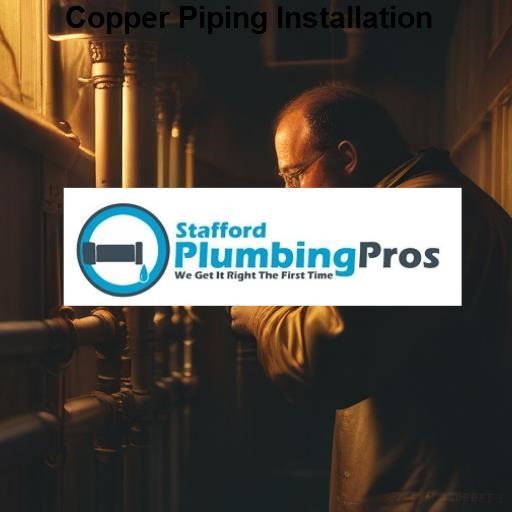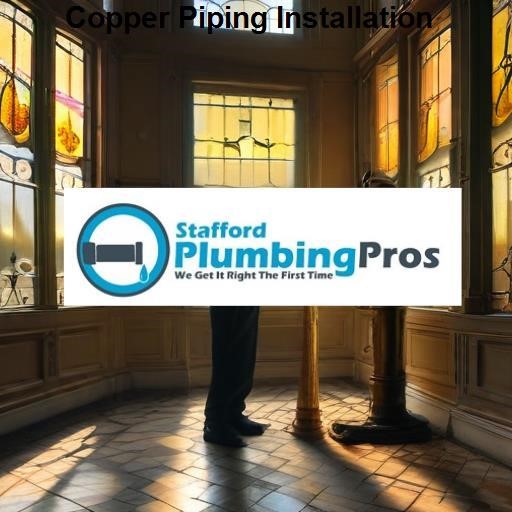Copper piping installation may not be the most glamorous home improvement project, but it is a crucial one that can greatly impact your property's overall plumbing system. According to the Environmental Protection Agency, copper pipes have been the material of choice for water supply lines in homes for over 80 years due to their durability, reliability, and resistance to corrosion.
When it comes to ensuring the longevity and efficiency of your plumbing system, professional installation is key. That's where Stafford Plumbing Pros comes in. With a team of highly trained and experienced plumbers, Stafford Plumbing Pros is the go-to choice for copper piping installation services in the area.
As experts in the field, Stafford Plumbing Pros understands the importance of using high-quality materials and following industry best practices when installing copper piping. Their attention to detail and commitment to excellence ensure that your new piping system will function flawlessly for years to come, saving you time and money on costly repairs down the line.
Don't leave something as vital as your plumbing system to chance. Trust the experts at Stafford Plumbing Pros to handle your copper piping installation needs with professionalism and precision. Your home deserves the best, and Stafford Plumbing Pros delivers just that.

Copper piping is a popular choice for residential and commercial plumbing systems due to its durability, reliability, and long lifespan. Copper pipes are known for their resistance to corrosion, making them a dependable option for carrying hot and cold water. The ease of installation and versatility of copper piping make it a preferred material for many plumbing projects.
When it comes to copper piping installation, it is crucial to seek professional help to ensure proper fitting and secure connections. Our team of experts has the knowledge and experience to handle copper piping installations efficiently and effectively. We understand the importance of using high-quality materials and following industry best practices to deliver reliable and long-lasting plumbing solutions. Whether you are renovating your home or constructing a new building, our professionals are here to provide top-notch copper piping installation services tailored to your needs.

Copper piping has been used for centuries due to its durability, reliability, and versatility in plumbing systems. Dating back to ancient Egypt, copper was recognized for its antimicrobial properties and resistance to corrosion, making it an ideal choice for transporting water. Over the years, advancements in metallurgy and plumbing technology have only enhanced copper piping's reputation as a top choice for residential and commercial plumbing installations.
The evolution of copper piping has shown remarkable consistency in its performance and longevity. Not only does copper withstand high temperatures and pressures, but it is also environmentally friendly, as it is a fully recyclable material. Its ability to resist rust and corrosion ensures a longer lifespan for plumbing systems, reducing the need for frequent repairs or replacements. As a result, copper piping continues to be a popular choice for modern plumbing installations due to its proven track record of reliability and safety.
Copper piping installation offers numerous benefits that make it a popular choice among homeowners and contractors alike. One key advantage of copper piping is its durability. Copper is highly resistant to corrosion, making it a long-lasting option for plumbing systems. In fact, copper pipes can last up to 50 years or more with proper maintenance.
Additionally, copper is a safe material for transporting water. Unlike other materials, copper does not leach harmful chemicals into the water supply, ensuring clean and safe drinking water for households. Its antimicrobial properties also help prevent the growth of harmful bacteria in the pipes, promoting better overall health and hygiene.
Moreover, copper piping is versatile and can be easily installed in various environments, including both indoor and outdoor settings. Its flexibility and heat resistance make it an ideal choice for carrying hot and cold water throughout a property. Overall, the benefits of copper piping make it a reliable and efficient option for plumbing systems.
Copper piping installation is a crucial aspect of plumbing systems due to the durability and reliability of copper pipes. The process involves several key steps to ensure a successful installation. Firstly, our team carefully plans the layout of the piping system, considering factors like water pressure, flow rate, and building codes. Next, we measure and cut the copper pipes accurately to fit the specific requirements of the project.
Following this, our professionals clean the pipes to remove any debris or oxidation that could affect the performance of the system. Then, we solder the joints using a high-temperature torch to create secure connections that are leak-proof. Finally, we conduct thorough testing to check for any leaks or issues before completing the installation process. Our commitment to precision and expertise guarantees a reliable copper piping system that stands the test of time.
When it comes to copper piping installation, choosing the right type of copper pipe is crucial for the success and longevity of your plumbing system. There are three main types of copper pipes commonly used in residential and commercial plumbing: Type M, Type L, and Type K.
Type M copper pipes are thin-walled and are suitable for use in above-ground water supply lines where water pressure is low. Type L copper pipes have a medium thickness and are commonly used for interior water supply lines and general plumbing projects. Type K copper pipes have the thickest walls and are ideal for underground water lines and harsher environments.
Each type of copper pipe has its own set of advantages and applications, so it's important to consult with our professionals to determine the best type of copper pipe for your specific plumbing needs. Our team can help you make an informed decision based on factors like water pressure, location, and budget, ensuring a successful copper piping installation that will stand the test of time.
When it comes to copper piping installation, having the right tools is essential for a successful and efficient job. Our team of professionals knows the importance of using the correct tools to ensure a high-quality installation that meets safety standards. Some of the key tools needed for copper piping installation include pipe cutters, deburring tools, pipe reamers, pipe benders, and soldering equipment.
Pipe cutters are crucial for cutting copper pipes to the correct length with precision. Deburring tools help remove any rough edges or burrs left after cutting, ensuring a smooth connection. Pipe reamers are used to chamfer the edges of the pipes to allow for a proper fit. Pipe benders are essential for shaping the copper pipes around corners and obstacles without causing kinks. Lastly, soldering equipment, including a torch, flux, and solder, is used to join the pipes securely.
By using the right tools and techniques, our team ensures that your copper piping installation is done correctly and will last for years to come.
When it comes to copper piping installation, there are common challenges that our team encounters and overcomes with expertise. One of the main issues is ensuring proper fittings and connections to prevent leaks. This requires precision and attention to detail during the installation process. Another challenge is dealing with potential corrosion over time, which can weaken the pipes if not addressed correctly. Our professionals are well-versed in selecting the right materials and techniques to minimize this risk.
Moreover, navigating tight spaces and complex layouts can also pose challenges during copper piping installations. Our team is experienced in overcoming these obstacles by strategizing the best approach for each unique situation. By staying updated on industry best practices and utilizing advanced tools, we tackle these challenges efficiently to deliver reliable and long-lasting copper piping installations for our clients.
Copper piping is a popular choice for plumbing systems due to its durability and reliability. However, even though copper is a sturdy material, leaks can still occur if the installation is not done correctly. To prevent leaks in copper piping, it is crucial to ensure proper fitting and soldering of the pipes. Our team of professionals emphasizes the importance of precise measurements and secure connections during the installation process to avoid potential leaks in the future. Additionally, regular maintenance checks are essential to detect any early signs of corrosion or damage that could lead to leaks over time. By taking proactive steps in the installation and maintenance of copper piping, homeowners can enjoy a long-lasting and leak-free plumbing system.
Pipe corrosion is a common issue that many homeowners face, especially with older plumbing systems. Corrosion can lead to leaks, low water pressure, and even water contamination if left untreated. One of the main causes of pipe corrosion is the quality of the water running through the pipes. If the water is too acidic or alkaline, it can corrode the pipes over time. Additionally, factors like high water pressure, temperature fluctuations, and the material of the pipes can also contribute to corrosion.
Dealing with pipe corrosion requires professional assessment and intervention. Our team of experts can conduct a thorough inspection to determine the extent of the corrosion and recommend the best course of action. This may involve pipe repairs, replacements, or the installation of copper piping, known for its durability and resistance to corrosion. By addressing pipe corrosion promptly, you can prevent costly damages and ensure the longevity of your plumbing system.
Copper piping is a popular choice for plumbing systems due to its durability and reliability. To ensure the longevity of your copper piping system, proper maintenance is key. One crucial tip is to regularly check for any signs of corrosion, leaks, or damage. This can help in early detection and prevent potential costly repairs down the line. Another important maintenance tip is to insulate your copper pipes, especially in cold weather climates, to prevent freezing and bursting. Additionally, flushing your pipes regularly to remove any sediment buildup can help maintain water flow and quality. By following these maintenance tips, you can extend the lifespan of your copper piping system and prevent unexpected plumbing issues.
Regular inspection of copper pipes is essential for maintaining the integrity and efficiency of your plumbing system. Over time, copper pipes can develop issues such as corrosion, leaks, or blockages that may go unnoticed until they cause significant damage. By conducting routine inspections, we can proactively identify any potential problems and address them before they escalate into costly repairs.
Statistics show that copper piping is one of the most durable and long-lasting materials used in plumbing, with a lifespan of up to 50 years or more. However, factors like water quality, temperature fluctuations, and installation errors can impact the longevity of copper pipes. Our team of professionals recommends scheduling annual inspections to ensure your copper pipes are in optimal condition and functioning effectively.
Regular inspection not only helps prevent emergencies but also improves the overall performance of your plumbing system. By investing in proactive maintenance, you can extend the lifespan of your copper pipes and avoid unexpected disruptions to your daily routine. Trust our experts to provide thorough inspections and reliable solutions to keep your plumbing system running smoothly for years to come.
Copper piping is a popular choice in plumbing due to its durability and resistance to corrosion. However, to ensure its longevity and efficiency, proper cleaning and upkeep are essential. Regular maintenance not only helps prevent leaks and blockages but also maintains the water quality.
One effective way to clean copper piping is by flushing the system with a vinegar solution to remove mineral deposits and buildup. This simple DIY method can improve water flow and extend the lifespan of the pipes. Additionally, insulating exposed pipes can prevent freezing in colder climates, reducing the risk of cracks or bursts.
By staying proactive with cleaning and maintenance, homeowners can avoid costly repairs and ensure a reliable plumbing system. Consulting with professionals for a thorough inspection and maintenance schedule can further enhance the performance and lifespan of copper piping in any property.